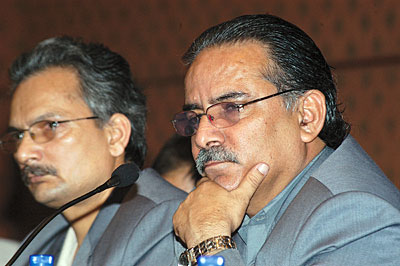 MIN RATNA BAJRACHARYA |
The last four weeks have not been encouraging for those of us watching talking heads on the evening news, or reading a rehash of headlines every morning.
The special committee has not been able to meet for the last three weeks, the rhetorical war among the senior leaders is getting vicious. The power struggle between and within parties is reaching a climax.
The media gives the impression that things are pretty messed up. But look at it this way: there is an undeclared democratic movement going on within the largest party that not too long ago was waging a war against the state.
A senior Maoist leader, asked if his party was headed for a split, put it this way: "What happened to the country in April 2006, is now happening within the UCPN (Maoist)."
It is tempting to oversimplify the rift within the Maoists. There are clear differences among the top leaders on several issues, but they all understand the strength of a united struggle. This is something the Congress, UML or the Madhesi parties could never do. The Maoist party is going about its internal disagreements in a slightly more mature manner.
The present rift may have come at the worst possible time, taking the focus off the peace process. But it is in the larger interest of the polity that the biggest party in the country comes unified and clear to the table. The opposition's trust deficit towards the Maoists is to an extent fuelled by the fact that they are never sure if the comrades they are negotiating with reflect the official position within the party.
And now, the Maoist Chairman has lost the trust both within and outside the party at a time when he needs it the most. This is not a happy scenario for him, nor to his party. And for the country it means continued instability and statelessness.
It is a mess Pushpa Kamal Dahal is responsible for creating, and he better clean it up if he wants to regain his credibility. He has to overcome his persecution complex and stop behaving as if the entire world is against him. He can start by regaining trust of his deputies. A party that has committed itself to democratic politics must first address the democratic deficit within itself. Wartime bureaucratic centralism must evolve to allow devolution of responsibility and power.
Then Dahal has to face the other parties at the negotiation table. Gone are the days he could fool people with his legendary persuasiveness. The opposition has heard enough promises, they want to see action. Anything less will stall the peace process and raise questions about the party's commitment to a new constitution.
It is true that the peace process cannot be reduced just to the issue of integration and rehabilitation of ex-combatants. The absence of violence in the material sense is not peace, it is organically linked with ensuring
justice and freedom in the new constitution. So, the drafting of an inclusive constitution is very much a part of the peace process.
Procedurally, however, the integration and rehabilitation of the combatants does not have to wait for the constitution.
The technical nitty-gritty of integration seems to be the least of the problems. The issue is trust, or the lack thereof. The Maoists have to trust that the public support behind them is more influential and reliable than the weapons they have stashed away. The quicker they jettison their guns, the more public support will they earn.
Mohan Baidya & Co, especially, have to understand this because (true or not) they are the ones slotted as "hardliners" and the onus is on them to clarify this within and outside the party. The clock is ticking, and the Maoists have less than two months to resolve their internal dispute and restart the sputtering peace process.
Read also:
New time frame, ANURAG ACHARYA
The next move, EDITORIAL



